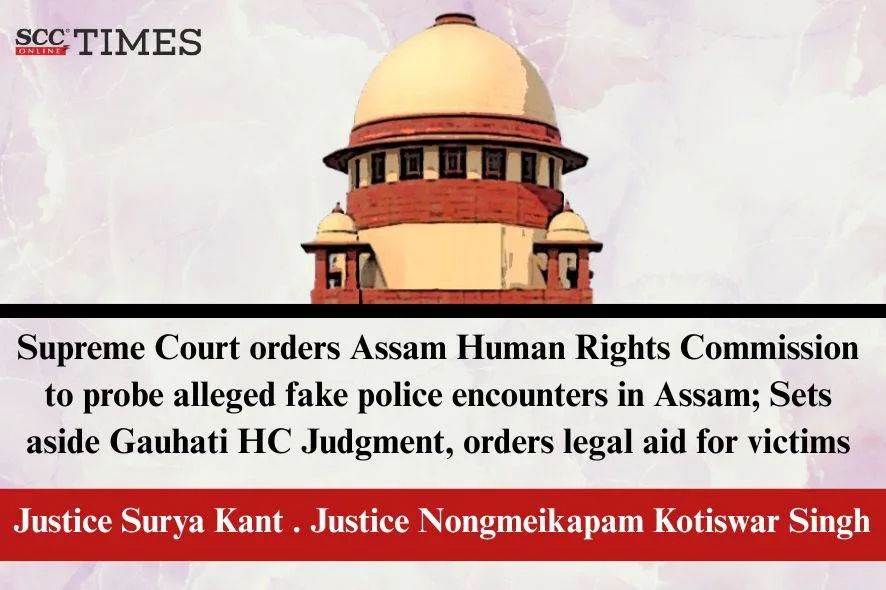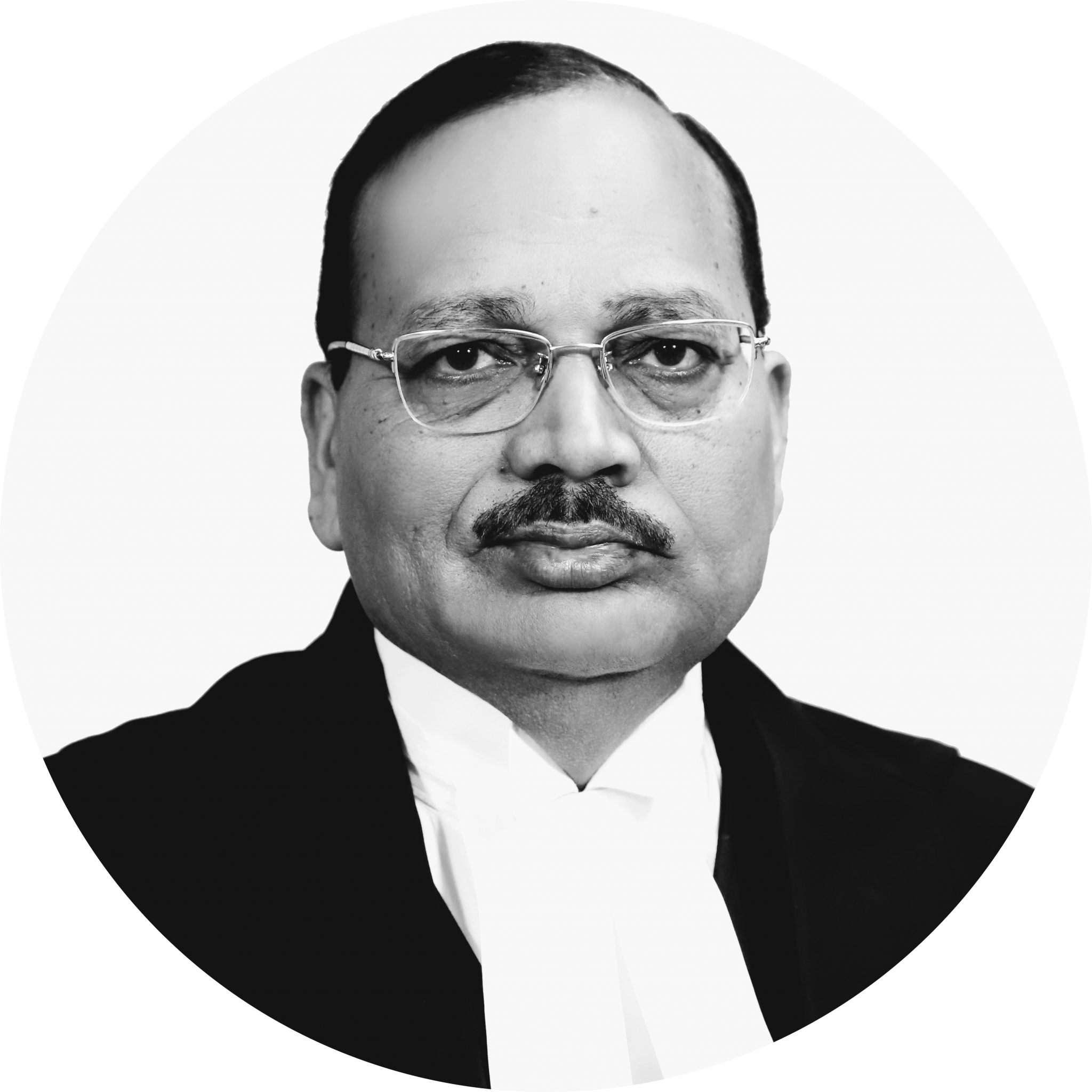Supreme Court: In an appeal filed against the Gauhati High Court’s dismissal of a Public Interest Litigation (‘PIL’) seeking records of all alleged fake encounters in the State of Assam, registration of FIRs against the erring police officials, and an independent investigation into such incidents, a Division Bench of Surya Kant* and Nongmeikapam Kotiswar Singh, JJ. gave the following directions:
a) The impugned judgment of the High Court dated 27-01-2023 was set aside.
b) The order dated 12-01-2022 passed by the full bench of the Assam Human Rights Commission (‘AHRC’), disposing of the issue on the ground that the subject matter was sub-judice before the High Court, was also set aside. The matter was directed to be reinstated on the board of the AHRC for necessary inquiry into the allegations independently and expeditiously, in accordance with law;
c) The AHRC was directed to issue a public notice inviting all individuals who claimed to be aggrieved (victims and their family members) by the alleged police encounters to come forward and furnish relevant information or evidence before the AHRC. The notice was to be published in at least one national English daily and one prominent vernacular newspaper with wide circulation throughout the State of Assam. The notice was also to include the contact details of officers of the Taluka and District Legal Services Authorities, thereby enabling the victims and/or their families to access free legal aid;
d) The AHRC was to ensure that the identity of the victims, their families, or any other individuals who approached it in connection with the inquiry remained strictly confidential. The AHRC was expected to adopt robust measures akin to witness protection protocols;
e) During the course of its inquiry, if the AHRC formed the opinion that a more detailed investigation was warranted, it was at liberty to initiate such investigation through means it deemed fit. For this purpose, the AHRC could engage the services of retired or serving police officers of impeccable integrity and unblemished record, provided that such officers were not connected with the police personnel involved in the alleged incidents;
f) The State of Assam was directed to extend full cooperation to the AHRC and ensure that all logistical, financial, and administrative requirements for such an investigation were promptly and adequately met;
g) The Assam State Legal Services Authority (‘ASLSA’) was directed to make legal assistance available to individuals seeking support in approaching or presenting their case before the AHRC. Its Member Secretary was directed to issue specific instructions to the District and Taluk level officers in this regard;
Background
The appellant, in a writ petition before the Gauhati High Court, alleged that approximately 80 fake encounters occurred in Assam between May and December 2021, resulting in 28 deaths and 48 injuries. The police reportedly justified these incidents as responses to escape attempts by the accused. Alarmed by the growing number of such encounters, the appellant first approached the National Human Rights Commission (‘NHRC’) on 10-07-2021. Around the same time, the AHRC had also taken suo motu cognizance of the issue.
Subsequently, on 20-12-2021, the appellant filed a PIL seeking records of the encounters, registration of FIRs against erring police officials, and an independent investigation. During the proceedings, the AHRC closed its inquiry citing the matter’s pendency before the High Court.
While the appellant sought FIRs from various districts, only 12 out of 30 responded, providing 41 FIRs. In response, the State filed affidavits acknowledging that 171 police encounters had taken place between May 2021 and August 2022, resulting in 56 deaths (including 4 custodial deaths) and 145 injuries.
The High Court, however, dismissed the PIL, stating that it was based on vague and unsubstantiated assertions and lacked foundational facts. It found no procedural irregularities or violations of the PUCL guidelines and denied the request for a CBI probe or SIT investigation. The Court did, however, direct that the appellant be provided with all legally permissible documents related to the cases.
The appellant asserted that no meaningful or effective inquiry has been undertaken in respect of these cases and the guidelines laid down in People’s Union for Civil Liberties v. State of Maharashtra, (2014) 10 SCC 635, has been flouted blatantly.
Issues
(a) Whether the allegations made by the appellant prima facie establish violation of the guidelines laid down by this Court in PUCL (supra).
(b) If so, what are the remedial measures?
Analysis and Decision
The Court referred to the PUCL case, which addressed allegations of fake or staged police encounters, emphasizing that such incidents must undergo strict legal scrutiny beyond mere police claims of self-defense. In PUCL, the Court had issued sixteen mandatory guidelines to ensure fair and independent investigation of encounter killings, consistent with Article 21 of the Constitution.
In the present matter, the Court noted the appellant’s concerns that victims and their families were either unaware of their legal rights or too intimidated to seek redress. While acknowledging these concerns, the Court examined whether a third party could invoke writ jurisdiction in matters primarily affecting specific individuals rather than the public at large. The Court recognized the liberalized doctrine of locus standi under PIL but cautioned that judicial restraint and circumspection are necessary to prevent prejudice or miscarriage of justice to victims when third parties initiate proceedings.
The Court stressed the importance of direct engagement with victims and families to ensure informed decisions about judicial recourse. While appreciating the appellant’s efforts in highlighting serious allegations, it observed that the aggregation of alleged encounter cases did not justify blanket judicial directives without individual scrutiny.
Reaffirming the constitutional balance, the Court underscored that procedural safeguards and the right of victims and families to be heard must not be overridden by generalized directions. Justice must be individualized, particularly where fundamental rights such as life and personal liberty are implicated.
The Court found several instances cited by the appellant regarding non-compliance with PUCL guidelines to be factually incomplete or incorrect. The appellant had failed to provide independent or verifiable evidence, relying instead on State data. Barring some exceptions, there was no prima facie evidence of systemic procedural breakdown or flagrant guideline violations. However, partial compliance, especially regarding mandatory magisterial inquiries, warranted further independent administrative scrutiny.
The Court also noted that forensic and ballistic analyses, although conducted, were delayed, undermining the integrity of investigations. It emphasized the need for timely procedural compliance to maintain fairness and objectivity.
While clarifying that no mala fides or institutional bias was found against the State of Assam, the Court held that an independent authority must verify compliance with PUCL safeguards in each case to promote transparency and accountability.
In conclusion, despite the appellant not conclusively proving illegality or procedural violations, the seriousness of the allegations warranted a fair and impartial inquiry. The Court reaffirmed its constitutional duty to protect fundamental rights and ensure adherence to judicially mandated procedures, regardless of the litigant’s identity.
Role of the National and State Human Rights Commissions in the instant controversy
The Court held that the role of Human Rights Commissions, both at the National and State levels, was paramount in a democratic polity governed by the Rule of Law. These Commissions served as independent watchdogs entrusted with safeguarding the dignity, liberty, and rights of individuals, especially the vulnerable and marginalized who may lack access to institutional remedies.
The Court expressed concern that the jurisdiction of the AHRC had been consciously circumvented. It was noted that the AHRC had taken suo-motu cognizance of the matter even before the appellant filed a complaint with the NHRC. Despite the AHRC having appropriate territorial and subject-matter jurisdiction, the appellant chose to invoke the Public Interest Litigation jurisdiction of the High Court at a later stage, which resulted in the AHRC disposing of the proceedings hastily.
The Court acknowledged that it did not appear the appellant intended to undermine or render statutory institutions redundant or to obstruct their independent functioning. It emphasised that State-level Human Rights Commissions were designed to be swift, accessible, and credible bodies for investigating and redressing violations of human dignity and constitutional protections. The efficacy of such institutions depended directly on public trust and procedural integrity. The Court expected these Commissions to adopt a proactive approach and to conduct proceedings with urgency and purpose reflective of the gravity of the allegations.
The Court viewed that the instant case involved several questions of fact which could not be effectively determined by the Court itself. The dispute was neither suitable for adjudication through a conventional trial nor could the investigation be fairly or effectively entrusted to the State Police, given that the allegations pertained to the conduct of police officials themselves. The principle of fairness, which underpins all just legal processes, mandated that any inquiry into the alleged excesses be independent and insulated from institutional bias. The risk of conflict of interest and concerns regarding real or perceived partiality rendered it inappropriate to involve the State Police in further inquiry.
The Court deemed it appropriate to entrust the inquiry to the AHRC for its logical conclusion. The earlier order by the full bench of the AHRC, which had disposed of the issue, was set aside. The matter was directed to be reinstated before the AHRC for an independent and expeditious inquiry in accordance with law.
The Court further directed that victims of the alleged incidents, or their family members, be given a fair and meaningful opportunity to participate in the proceedings. To this end, the AHRC was instructed to issue a public notice inviting all aggrieved individuals to come forward and furnish relevant information or evidence. The notice was to be published in at least one national English daily and one prominent vernacular newspaper with wide circulation in Assam, in a manner accessible and understandable to the general public, including those in remote and conflict-prone areas. The notice was also to include contact details of officers of the Taluka and District Legal Services Authorities to enable victims or their families to access free legal aid in approaching the AHRC.
The AHRC was permitted to engage retired or serving police officers of impeccable integrity who were not connected with or subordinate to the police personnel involved in the alleged incidents. The selection of personnel and manner of investigation was to remain within the AHRC’s discretion.
The State of Assam was directed to extend full cooperation with the AHRC, ensuring all logistical, financial, and administrative requirements for the inquiry were met promptly. The State was also required to provide access to records, facilitate forensic and expert resources, and remove any institutional barriers hindering the AHRC’s functioning.
Finally, the appellant, in his capacity as an Advocate, was permitted to represent victims or their families before the AHRC, if engaged by them.
CASE DETAILS
|
Citation: Appellants : Respondents : |
Advocates who appeared in this case For Petitioner(s): For Respondent(s): |
CORAM :




